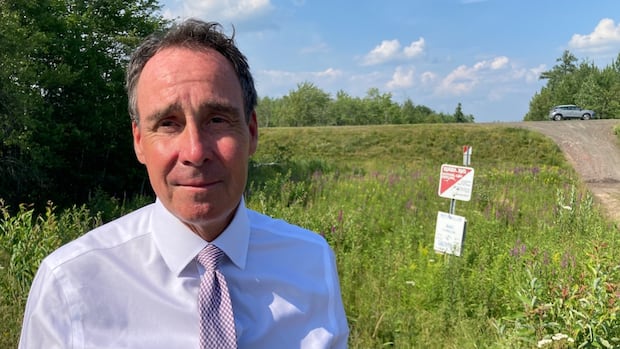New BrunswickAs New Brunswick continues to pitch an Eastern Energy pipeline project to the federal government, the province now says it’s also been in talks with private companies.Conversations still in early stages, minister saysSam Farley · CBC News · Posted: Sep 04, 2025 7:48 AM EDT | Last Updated: 2 hours agoNew Brunswick Minister of Natural Resources John Herron says the province has been in early discussions with companies about the possibility of constructing a natural gas pipeline from Quebec City to Saint John. (Jacques Poitras/CBC)As New Brunswick continues to pitch a major pipeline project to the federal government, the province now says it’s also been in talks with private companies to realize its ambitious plan.In an interview with Radio-Canada, Natural Resources Minister John Herron said the province has spoken with TC Energy, a pipeline company, and Repsol, which operates a natural gas plant in Saint John, as part of an ongoing push to bring the product to Atlantic Canada and reach what the minister has called “energy sovereignty.”Herron has previously talked up the potential for an LNG plant, or liquefied natural gas facility, coming to Saint John, from where the product could be shipped overseas to Europe.While Herron said he’d describe the conversations as being in the “nascent stage,” he said “it’s quite clear that there is a demand for LNG in Europe, and Canada has natural gas to offer.”Calling it a “pan-Canadian, nation-building project,” Herron said the pipeline would connect a natural gas pipeline that currently ends in Quebec City to the port of Saint John. He added that the pipeline would initially be owned by New Brunswick First Nations and the federal government, with the private sector eventually purchasing the government’s share. “But it’s more than just a concept, because we’re actually talking to real companies,” he said.Herron said Saint John is especially attractive for the federal government’s three- to four-year timeline because it has existing LNG infrastructure and pipeline connectivity.Warren Mabee, director of the Institute for Energy and Environmental Policy at Queen’s University, said Saint John has potential as a location for the project. (Marc Godbout/Radio-Canada)With the war in Ukraine ongoing, Herron said Europe would prefer to buy natural gas from Canada instead of Russia, which gives the project another incentive. The federal government has been looking into the possibility of selling natural gas to German markets. Herron acknowledged the plan would be expensive, estimating it at a $4- to $5-billion investment, and noted the pipeline from Alberta to Ontario would need additional capacity. The prospect has piqued the curiosity of one energy expert, however.”With the pressure we’re receiving from the U.S. and the … desire to build more trans-Canada infrastructure, this is the time to open the conversation about what a pipeline and export terminal might look like,” said Warren Mabee, director of Queens University’s Institute for Energy and Environmental Policy, in an interview on CBC Radio’s Shift. He said it would be a big project that requires a buy-in from local communities and First Nations along the pipeline route.”[Herron] talks about having First Nations ownership, which is laudable. It’s a great idea, but are the First Nations at the table and are they ready to have those conversations?”Ottawa has also looked at Churchill, Man., and Montreal as other possible sites for infrastructure upgrades, but Mabee believes Saint John is the best option.The Canaport LNG terminal, located on Saint John’s east side, is owned by Repsol and Irving Oil Ltd. (CBC)Churchill has “really good access to Europe during the ice-free months,” Mabee said, but added that there’s still a long swath of the year where that port is inoperable. If the product is shipped from Montreal, he added, “you’ve got at least a day of travel down the Saint Lawrence, if not two, before you start to get out into the open ocean.””Saint John has a much closer shot into the open ocean. It has closer access, essentially, to Europe than either of the other ports that we’re talking about,” he said.Two years ago, Repsol dropped the idea of building an LNG plant in Saint John because it was too costly. “My understanding is that a couple years back it was the lack of access to natural gas that made the company decide not to go ahead,” Mabee said.”There isn’t a pipe that connects Saint John to the rest of Canada without going through the U.S., and that missing link, if you like, is why we haven’t seen these developments in the past.”Mabee said if the province is serious, it should start getting out into the communities along a possible route to open a discussion.”We have wonderful maps and then we go out and start talking to the people that will be impacted. That’s where the pushback comes.”ABOUT THE AUTHORSam Farley is a Fredericton-based reporter at CBC New Brunswick. Originally from Boston, he is a journalism graduate of the University of King’s College in Halifax. He can be reached at sam.farley@cbc.caWith files from Radio-Canada and Shift
N.B. government says it’s in talks with companies over LNG pipeline possibilities











